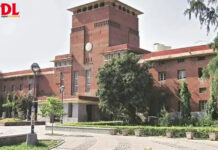The four-year period beginning 2006-07 has not only witnessed an impressive growth for the Indira Gandhi National Open University (IGNOU) but also resulted in empowering its academic and non-academic staff on all counts. The University appointed 146 academics during the 11th Plan Period (2006-2011). The total number of academics who have been promoted, at least once during 2006-2011, stands at a record 122, while the number of administrative staff promotion has reached 300 in the same period. The period beginning November 2006-2007 has been a golden era as far as the Human Resource practices within the IGNOU system are concerned, and the role of Academic Co-ordination Division and Administrative Division is crucial in achieving this goal
US
The latest survey by global research firm Forrester informed that the information and communication technology (ICT) market in the US is all set to experience a strong thrust in 2011 with a growth of eight per cent as its now recovering from the ripple effects of the global slowdown. “There is a strong momentum in business purchase of technology goods and services in the US market due to economic rebound. The US IT market is set to grow eight percent to $608 billion over 2010,” Forrester's principal analyst Andrew Bartels said, citing the survey report. Forrester raised the growth forecast from 7.4 per cent projected in the first quarter (January-March) of 2011 as the US market posted 8.9 per cent growth in 2010 against an 8.4 per cent projection. “Vendors have to prepare for better days and ensure they pick the right growth verticals after studying the key forces driving the US tech market,” Bartels asserted.
India to assist Sri Lanka in VTC set up
With a tide of technological development sweeping across all shores of education in almost all parts of India, vocational training has been a major part of it which is also developing and spreading its wings across. With the assistance of the Ministry of Youth Affairs and Skills Development, Government of India, few more vocational educational centres are set to be established in the north and the east as well as in Nuwara Eliya. The Ministry said a feasibility study had been conducted by the Hindustan Machine Tool International Institute and they hoped to establish the vocational centres within this year. The Rs. 2,670 million project initiated by the Ministry will have a contribution of Rs. 2,375 from the Indian government along with a transfer of knowledge in IT, A/C plant repairing and motor mechanics, to name a few. A Youth Ministry official said the Memorandum of Understanding (MoU) had been signed between the Minister of Youth Affairs and Skills Development, Dullas Alahapperuma and High Commissioner of India, Ashok K. Kanth. The centres are to be established in Jaffna and Vavuniya while arrangements have been made to establish centres in Batticaloa, Trincomalee and Nuwara- Eliya. The ministry said Rs. 325 million had been set aside for the vocational centres at Vandaramullai and Ondachchimadam, Batticaloa. Ministry officials said the Indian government had agreed to provide aid for the initiative as they were greatly impressed with the programmes launched by the Ministry.
Intel ICT to boost rural health care services in Abuja
As part of its corporate social responsibility efforts, Intel Corporation has decided to launch a pilot electronic health (e-Health) programme in Nigeria's Federal Capital Territory (FCT) to address some of the challenges that the nation is facing in healthcare. In early 2009, the Nigerian Federal Capital Territory Millennium Development Goals Unit (FCTMDGU) health officials and Intel Corporation began discussing ways that Information and Communication Technology (ICT) could be used to improve health and healthcare delivery in rural areas. According to the Business Development Manager, Intel Nigeria, Mr. David Ibhawoh, the company observed that a large percentage of the people in the country do not have access to health and also where there were any they lacked the specialist, especially dermatologists. Intel– the world's largest semiconductor company, with 80 per cent of the world's market for microprocessors, the brains of personal computers, he said, decided to take healthcare to the communities through mobile health (mHealth) and telemedicine which eventually gave birth to the Mailafiya Health Programme. He said there were consultations with the chiefs so as to allay their fears and design an intervention programme that is most suitable for them.
IIMA focuses on Amul, Nestle potentials to control price rise
Indian Institute of Management, Ahmedabad (IIM-A) suggests that the country should enhance business models like Amul, Nestle and others to control the rapid price rise of agro food products in the country. The researchers said that in order to meet up to various challenges in the agro food industry, it is necessary to adopt innovations and institutional models that have emerged from within the country. The study says that this innovative approach is best showcased by commercial ventures like Amul, Nestle, Pepsi, Suguna and Himachal Pradesh Horticultural Produce Marketing and Processing Corporation. The study, slated to be published as a book by FAO in 2011, was conducted by IIM-A professor Vasant Gandhi and doctoral student at IIM-A Dinesh Jain was commissioned by Food and Agricultural Organisation (FAO) of the United Nations. The study recommends that the Central government should support the emergence of more new indigenous models in agro food industries.
IIT-D students cater with innovative technological ideas
Nearly 250 innovations were up by students from all disciplines in this year's open-house show at IIT Delhi which had a plethora of out-of-the-box inventions and stunning machines. From a simple clothes drying machine and an aloe vera extractor to a friction-based page-turning machine and a single-seed sower – there was something for everyone which, if put up commercially, could make lives easier, healthier and more interesting. No wonder, school and college students, researchers and even housewives came visiting the campus that had scientific models all over in the golden jubilee year of IIT-D. According to Ranjana Mehta from Pitampura there is a lot of freshness in ideas as these are mady by students.”I really liked the bamboo cycle and the page-turning machine as students have thought about the environment and the disabled in these projects. My 13-yearold son loved the 3D Snakes & Ladders and the chance to interact with IIT students, though,” said Mehta. The bamboo cycle was designed, especially for rural areas, by second-year students of MDes, Dwaipayan Bhattacharjee and Shubham Ranjan Sharma. It is a hand-made cycle put together with bamboo and functional parts of a discarded bicycle. “It is light-weight and can be made at a very low cost. This one just cost us Rs 1,800 and can take 70-80 kilogram weight. It would last about seven to eight years as compared to a normal cycle, which can be used for at least 15 years,” said Dwaipayan. The page-turning machine, ideal for those who lost their limbs, is also a low-cost option. The machine is fitted on a table with a pointer that can be moved with just the movement of the head. “It's a compact product, which may cost only Rs 1,000,” said Gunjit Kumar, who made this machine with another student, Sanjeev Sharma. It can also be used in museums where touching books is not allowed.
IGNOU focuses on Nepal
To integrate existing two education systems in Nepal, an Indira Gandhi National Open University (IGNOU) initiative has focussed on Kathmandu's potentials to take up new special initiatives. “The open education will be highly beneficial in the country like Nepal characterised by low literary rate and remote geography,” At a programme organised by IGNOU here recently, Executive Chief of International Centre for Academy, Amit Giri said. He further said a new system has been introduced under which people having no time to attend college everyday could fulfil one's academic pursuit remaining at home.
Experts talk about improving higher edu system
Highlighting the challenges and opportunities in promoting professional education in South Asia, Mohd Masood Ahmad, member, executive board and executive director, Association of Management Development Institutions of South Asia (AMDISA), said focus on natural and human resources is a must for maintaining quality of professional education. Inaugurating the two-day directors' conclave programme, jointly organised by the Faculty of Management Studies (FMS), Banaras Hindu University (BHU) and GLA University, Mathura, Masood said optimum utilisation of resources, strong networking and thirst for learning are important for development and growth of professional education in the country. Earlier, presiding over the inaugural function, BHU vice-chancellor D P Singh highlighted the importance of framework for education in order to make the nation powerful. He said it is necessary to focus on rural India besides viewing education as a change agent system in the country. The inaugural day of the programme witnessed a total of three technical sessions touching different aspects of higher education including challenges and introspection, strategies for building excellence in higher education and values and leveraging resources. It may be mentioned here that the two-day programme is aimed at providing a platform to the academic administrators and heads of institutions across the country to discuss ways for improving the higher education system. A number of senior faculty members including head and dean, FMS, S K Singh and secretary general Dr H P Mathur were also present on the occasion.
UAE leads Arab nations among top-30 ICT users
Three Arab countries
IGNOU to establish RCs in Bihar, Jharkhand
Indira Gandhi National Open University (IGNOU) is about to establish teo more regional centres in the Saharsa and Deaoghar. With the approval of IGNOU Vice-Chancellor Prof. V.N. Rajasekharan Pillai, the University has decided to establish these two centres in Bihar and Jharkhand. According to the notification issued by U.S. Tolia, Registrar of the University, the Board of Management (BoM) at its 107th meeting held in April 2011 approved the proposal for the establishment of the Regional Centre at Saharsa, which shall cover the districts of Khagariya, Saharsa, Supaul, Madhepura, Katihar, Arariya, Kishanganj and Purnia. The districts to be covered under the Regional Centre of Jharkhand in Deoghar are Godda, Deoghar, Sahibganj, Pakur, Dumka, Jamtara, Dhanbad, Bakaro and Giridih. The Regional Centres are responsible for the promotion of the Open University system; development, maintenance and monitoring of Study Centres and Student Support Services; and organisation of staff development programmes in the region. They are established normally with cooperation and support of the respective state governments. The perspective of the University is to provide one Regional Centre for every state in the country. A Regional Centre has been defined under Section 2(J) of the IGNOU Act as under: Regional Centre means a Centre established or maintained by the University for the purpose of coordinating and supervising the work of the Study Centres in any region and for performing such other functions as may be conferred on such Centre by the BoM.



















